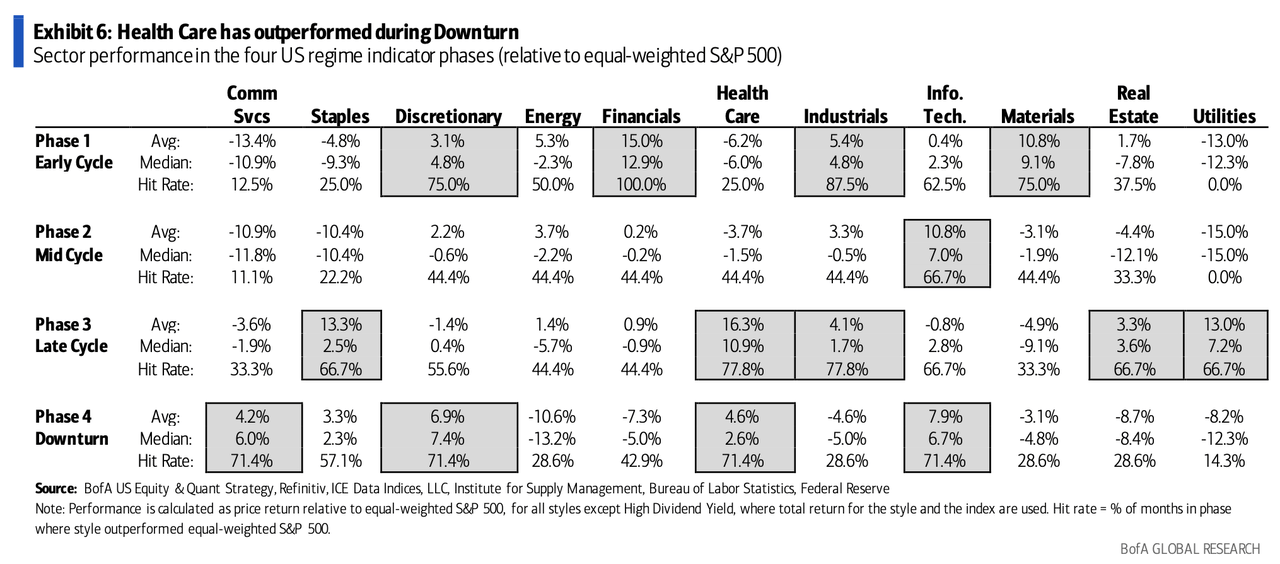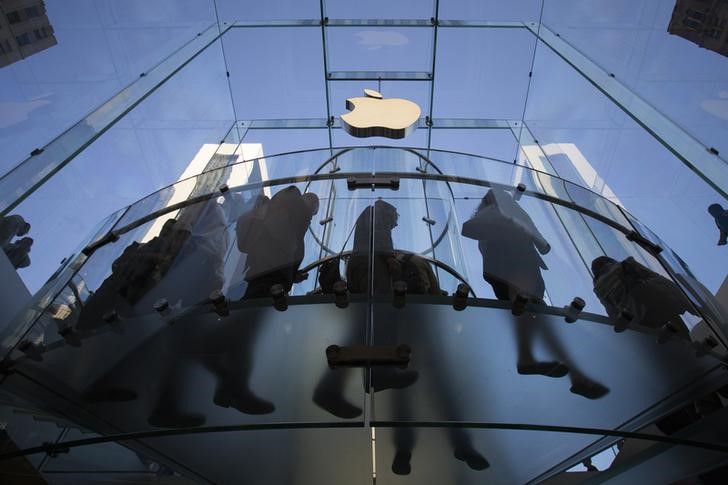As market uncertainty continues and inflation remains a problem, BofA Securities says that health care is an industry investors might want to position themselves more in.
Given that the U.S. might already be in a recession or approaching one, BofA analysts provide five reasons to own health care: defensive; strong earnings growth; downturn outperformer; strong fundamentals; and inexpensive.
“Health Care has generated the strongest earnings growth of sectors historically….,” the health care team writes. “An aging population is also a secular tailwind for the sector.”
Regarding current valuations, they added, “pharma trades at a near-record discount vs. its defensive peer staples, and biotech also trades at a near-record discount vs. its growth peer tech.”
Some caution advised
However, the BofA health care team advised that there are also risks to health care stock investing currently. These are that the industry is consensus long; the secular backdrop favors cyclicals; health care is dominating IPOs, and government spending.
“Ahead of the most anticipated recession in history, active funds’ overweight in defensives vs. cyclicals is more extreme than 2009 or 2020, two severe global recessions, including a near-record 15% overweight in health care,” the team wrote.

The “indebtedness of US government and the return of brinksmanship pose risk to government spending on health care,” they added.
The team noted that health care historically has been negatively correlated with inflation, adding that secular inflation pressure will be a headwind.
What to buy
Despite these concerns, the BofA health care team provides picks for various health care industries. Among managed care companies, Humana (HUM) comes out on top due to its significant exposure to Medicare Advantage. The company has already twice raised its MA growth outlook for 2023.
“The company is reaccelerating its growth trajectory after focusing on margins in 2022,” the team says. “Over the long-term, its services arm (CenterWell) should aid what is already a mid-teens earnings grower.”
In the large biopharma space, BofA is keen on both Eli Lilly (NYSE:LLY) and Merck (NYSE:MRK). For the former, the team recognizes the company’s “impressive new product cycle and best-in-class growth profile versus peers,” while Merck (MRK) will continue to benefit from a strong core business, particularly Keytruda (pembrolizumab) and Gardasil 9 (human papillomavirus 9-valent vaccine, recombinant), and its pipeline.
BofA’s large biotech pick is Vertex (NASDAQ:VRTX) due to its domination in the cystic fibrosis market and the launch of exa-cel for sickle cell anemia by the end of the year.
The firm is also bullish on BioMarin Pharmaceutical (BMRN) based on Roctavian’s (valoctocogene roxaparvovec) likely US approval and the long-term commercial opportunity it provides. The therapy is used to treat hemophilia A.
In life sciences and diagnostics, BofA’s top pick is Thermo Fisher Scientific (TMO), which it calls the largest and most diversified life sciences tools company.
“The company’s scale and positioning as the only end-to-end provider to biopharma customers is driving share gains across its businesses, and its capabilities are unmatched with a comprehensive portfolio of laboratory instruments, reagents, & consumables, deep biopharma services offerings and a broad distribution channel,” the health care team wrote.
BofA provides three selections in the healthcare technology and distribution field: drug wholesalers McKesson (MCK) and AmerisourceBergen (ABC), and CVS Health (NYSE:CVS).
On McKesson (MCK), “the fundamentals for the core Pharma and Med-Surg businesses for the company remain robust and should continue to remain defensive in any potential recessionary environment.”
“In addition to the core business, opportunities in specialty distribution will serve as a tailwind to ABC as it expands its presence in higher growth, higher margin areas,” the team wrote of AmerisourceBergen (ABC).
BofA sees brighter risk-return opportunities for CVS (CVS) in the longer term despite a lack of near-term catalysts that have weighed on its stock price.
“The current valuation and free cash flow generation remain quite appealing. Additionally, the recent Signify and Oak Street deals should bolster the enterprise and continue to drive the next leg of growth for the company’s care delivery strategy.”
More on health care and recessions
CVS Health: This Cash-Rich, Predictable Business Should Fare Well Even In A Potential Recession
Humana: Leadership In Medicare Advantage Underpins Recession-Resilient Value
AbbVie: With Banks In Distress, Look At Recession-Resilient Healthcare Companies
Bristol-Myers Squibb: A Recession-Resistant Route Forward
Seeking Alpha authors best investment ideas for a potential recession
















